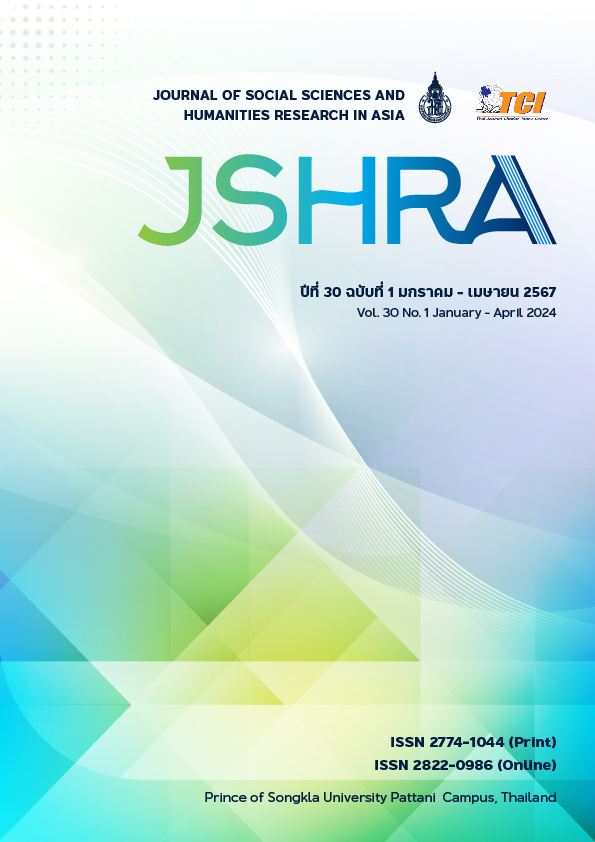The Digital Divide and Citizens' Perceptions of Government Responsiveness: A Case Study of Udon Thani Municipality, Thailand
Abstract
Globally, digital technology is indispensable to people's daily life. Since the 1990s, the Thai government has attempted to use digital technology as a tool for national and local government administration and public services. Literature advises additional research on the digital divide, particularly on the effects of the digital divide on public views of government responsiveness. This study seeks to address the question, "How does the extent to which citizens have access to and utilize digital technologies influence their perceptions of government responsiveness?" This research focuses on the residents of Udon Thani Municipality, one of the major cities in Thailand. The researchers employ a quantitative research method, collect data by surveying the opinions of 130 individuals using questionnaires, and then use multiple linear regression analysis to determine the relationship between citizens' perceptions of the responsiveness of the Udon Thani Municipality and digital capacity, as well as other personal characteristics. The results demonstrate that citizens' access to and benefit from digital technology affects their perceptions of government responsiveness. Marital status and age are found to be also correlated with perceptions of government responsiveness. These insights underscore the importance of incorporating digital inclusivity in policy strategies to foster an environment where all citizens feel heard and served by their government. Recommendations are also provided regarding the supply and delivery of urban public services through digital technology during a transitional era in which people's access to and utilization of digital technology continues to vary.
References
Bratton, M. (2012). Citizen perceptions of local government responsiveness in Sub-Saharan Africa. World Development, 40(3), 516-527. https://doi.org/10.1016/j.worlddev.2011.07.003
Cho, W. (2010). Citizens’ perceptions of government responsiveness in Africa: Do electoral systems and ethnic diversity matter? Comparative Political Studies, 43(12), 1650–1674. https://doi.org/10.1177/0010414010374019
Grossman, G., & Slough, T. (2022). Government responsiveness in developing countries. Annual Review of Political Science, 25(2022), 131-153. https://doi.org/10.1146/annurev-polisci-051120-112501
Hargittai, E. (2001). Second-level digital divide: Mapping differences in people’s online skills. First Monday, 7(4). https://doi.org/10.5210/fm.v7i4.942
Kaguara, A., & Wanjiru, M. (2012). Digital divide: The glaring reality. Retrieved April 1, 2023, from https://profiles.uonbi.ac.ke/node/42824
Kastelli, I., Dimas, P., Stamopoulos, D., & Tsakanikas, A. (2022). Linking digital capacity to innovation performance: The mediating role of absorptive capacity. Journal of Knowledge Economy, 14(4). https://doi.org/10.1007/s13132-022-01092-w
Kenski, K., & Stroud, N.J. (2006). Connections between internet use and political efficacy, knowledge, and participation. Journal of Broadcasting & Electronic Media, 50(2), 173-192. https://doi.org/10.1207/s15506878jobem5002_1
Lybeck, R., Koiranen, I., & Koivula, A. (2023). From digital divide to digital capital: The role of education and digital skills in social media participation. Universal Access in the Information Society, 1-13. https://doi.org/10.1007/s10209-022-00961-0
Malisuwan, S., Kaewphanuekrungsri, W., & Milindavanij, D. (2016). Digital divide in Thailand: Analysis and recommendations. International Journal of Advanced Research in Engineering and Technology, 7(1), 41-46.
McKenzie, J., Castellón, R., Willis-Grossmann, Emma, Landeros, C., Rooney, J., & Stewart, C. (2023). Digital divides, generational gaps, and cultural overlaps: A portrait of media use and perspectives of media in Thailand. Media Psychology, 27(1), 106-134. https://doi.org/10.1080/15213269.2023.2222533
National Statistical Office, Udon Thani Province. (2023). Key indicators of the province. Retrieved April 1, 2023, from https://udon.nso.go.th/statistical-information-service/key-indicatorsof-the-province.html
Novikova, I., & Liebert, S. (2021). Citizens’ perception of government responsiveness: building an engaged citizenry. Asia Pacific Journal of Public Administration, 43(4), 298-316. https://doi.org/10.1080/23276665.2021.1966815
OECD. (2019). Government at a glance 2019. OECD Publishing: Paris. https://doi.org/10.1787/8ccf5c38-en
OECD. (2021). Government at a Glance 2021. OECD Publishing: Paris. https://doi.org/10.1787/1c258f55-en
Robinson, L., Cotten, S.R., Ono, H., Quan-Haase, A., Mesch, G., Chen, W., ... & Stern, M.J. (2015). Digital inequalities and why they matter. Information, Communication & Society, 18(5), 569-582. https://doi.org/10.1080/1369118X.2015.1012532
Sangsuriyong, R. (2018). Efforts to bridge digital divide in Thai society. Veridian E-Journal, Silpakorn University, 11(3), 1056-1084.
Setthasuravich, P., Sirikhan, K., & Kato, H. (2022, June 20th - 21st). Spatial econometric analysis of the digital divide in Thailand at the sub-district level: Patterns and determinants. 31st European Regional ITS Conference, Gothenburg 2022: Reining in Digital Platforms? Challenging monopolies, promoting competition and developing regulatory regimes [Conference]. Gothenburg, Sweden.
Smith, A., & Anderson, M. (2017). Automation in everyday life. Retrieved April 1, 2023, from https://www.pewresearch.org/internet/2017/10/04/automation-in-everyday-life/
Steele, C. (2018). The impacts of digital divide. Retrieved April 1, 2023, from http://www. digitaldividecouncil.com/the-impacts-of-digital-divide/
Van Dijk, J. (2018). Afterword: The state of digital divide theory. In M. Ragnedda & G. W. Muschert (Eds), Theorizing digital divides (pp. 199-206). New York: Routledge.
Van Dijk, J.A. (2019). The digital divide. Polity.
Wagner, K.M., Gray, T.J., & Gainous, J. (2017). Digital information consumption and external political efficacy in Latin America: Does institutional context matter? Journal of Information Technology & Politics, 14(3), 277-291. https://doi.org/10.1080/19331681.2017.1337601
Warschauer, M. (2004). Technology and social inclusion: Rethinking the digital divide. Cambridge: MIT Press.










